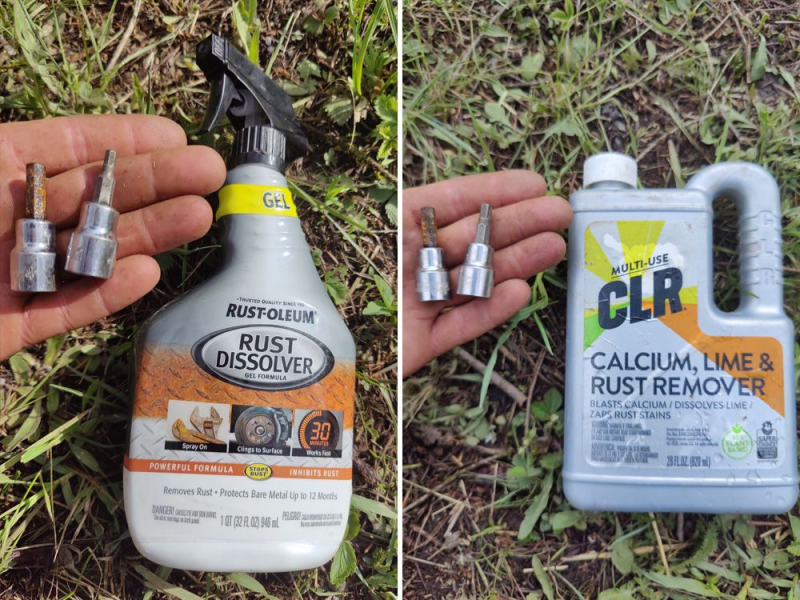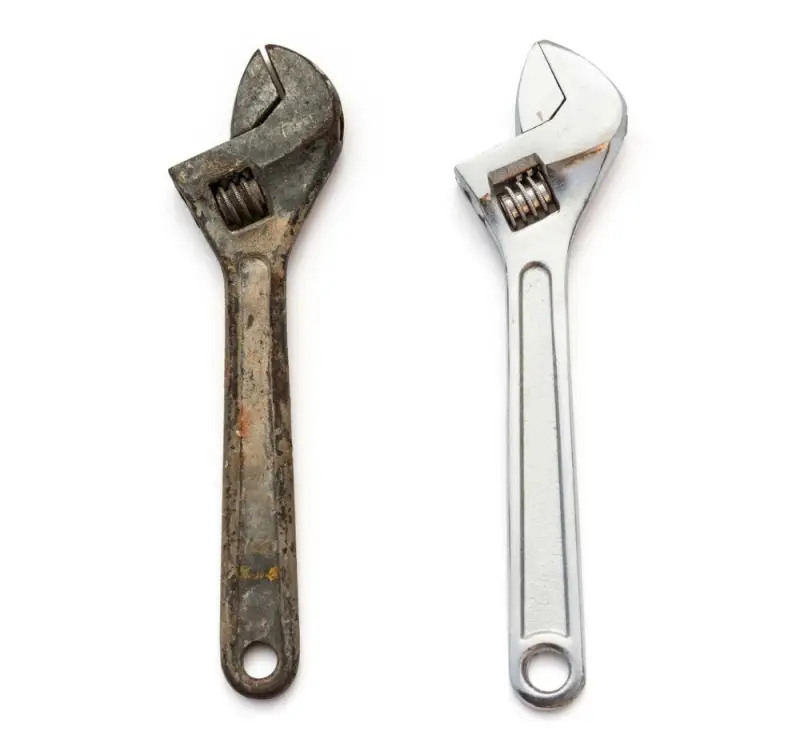Rust is an enemy of metal, and it can cause significant damage if left unattended. The corrosion of iron and steel can result in unsightly stains and even weaken the metal, making it brittle and prone to breaking. To remove rust, you need a reliable and effective rust remover tool. In this article, we will introduce you to the best rust remover tools available on the market, so you can choose the right one for your needs.
One popular option is an electric rust remover, which uses high-frequency vibrations to agitate the rust and loosen its grip on the metal surface. These tools come in a variety of sizes and shapes and are ideal for removing rust from large, flat surfaces such as car bodies, trailers, and machinery. Some models even have a built-in wire brush for scrubbing away the loosened rust.

Another option is chemical rust removers, which typically come in the form of a gel or spray. These products are designed to dissolve rust on contact, making it easy to wipe away with a cloth. Chemical rust removers are often more affordable than electric rust removers and can be a great option for removing rust from small or hard-to-reach areas. However, they can also be more dangerous to work with and may require protective gloves and eye protection.
Best Rust Remover Tools Overview
Let’s start with the electric rust remover tools. These guys are absolute game-changers! They work by using high-frequency vibrations to agitate the rust and loosen its grip on the metal surface. This makes removing even the most stubborn rust a breeze. The variety of sizes and shapes available means you can find the perfect tool for removing rust from large, flat surfaces like car bodies, trailers, and machinery. Some models even have a built-in wire brush for scrubbing away the loosened rust, which makes them super convenient and versatile.
Next, let’s talk about chemical rust removers. These come in the form of a gel or spray and are designed to dissolve rust on contact. I’ve been really impressed with how quickly and easily rust can be removed using these products. They’re often more affordable than electric rust removers and can be a great option for removing rust from small or hard-to-reach areas. However, it’s important to use protective gloves and eye protection when working with chemical rust removers, as they can be dangerous if not used properly.
Whether you’re looking for an electric rust remover tool, a chemical rust remover, or something in between, there’s a product out there that will meet your needs. As a materials scientist, I believe it’s important to take care of your metal items to prevent rust and corrosion, and with the right rust remover tool, you’ll be able to do just that!

Best Rust Remover Tools Comparison Table
There are several types of rust remover tools available on the market, and each one uses different ingredients to remove rust. Let’s take a closer look at the most popular rust remover ingredients and compare them.
- Electrolytic Rust Removal: This method uses electricity to dissolve rust and is often performed using a battery and saltwater solution. The electrical current causes the rust to break down, making it easy to remove with a wire brush or sandpaper.
- Phosphoric Acid: This is a common ingredient found in many chemical rust removers. Phosphoric acid reacts with the rust to dissolve it, making it easy to wipe away with a cloth.
- Citric Acid: This ingredient is derived from citrus fruits and is also commonly found in chemical rust removers. It works by reacting with the rust to dissolve it, and is often considered a more environmentally friendly option than phosphoric acid.
- Acetone: This ingredient is a solvent that is commonly used to dissolve rust. It works by dissolving the oil and grease that holds the rust in place, making it easier to remove.
- Sodium Carbonate: This ingredient is also known as washing soda and is often used in rust removers for its cleaning properties. It works by reacting with the rust to dissolve it, and can also be used to neutralize acidic rust removers.
Here’s a comparison table of the most popular rust remover ingredients:
| Ingredient | Pros | Cons |
|---|---|---|
| Electrolytic Rust Removal | Fast and effective | Can be messy and requires specialized equipment |
| Phosphoric Acid | Affordable and readily available | Can be dangerous to handle |
| Citric Acid | Environmentally friendly | May not be as effective as phosphoric acid |
| Acetone | Can dissolve oil and grease | Can be flammable |
| Sodium Carbonate | Safe to handle and can neutralize acidic rust removers | May not be as effective as other ingredients |
In conclusion, the best rust remover tool for you will depend on your specific needs and preferences. Each ingredient has its pros and cons, so consider the type of rust you need to remove, the size and location of the affected area, and your personal preferences when choosing a rust remover tool.

Equipment To Work With Rust Removers
When working with rust remover tools, it’s important to have the right equipment to ensure a safe and effective removal process. Here’s a list of equipment that can be helpful when using rust remover tools:
| Equipment | Purpose |
|---|---|
| Protective Gloves | To protect your hands from chemical rust removers or abrasive surfaces |
| Eye Protection | To protect your eyes from chemical splashes or dust |
| Wire Brush or Sandpaper | To remove loose rust or smooth the surface after removing rust |
| Clean Rags | To wipe away dissolved rust or apply rust remover solution |
| Steel Wool | To remove rust from small or intricate surfaces |
| Protective Mask | To protect your respiratory system from inhaling dust or fumes |
| Electrical Ground Clamp | To provide a safe and secure connection when using electrolytic rust removal |
Having the right equipment on hand can make a big difference in the effectiveness and safety of your rust removal process. Consider the type of rust remover tool you’ll be using and the specific requirements of your project when selecting the equipment you’ll need.
A Step-by-Step Guide on How to Work With Rust Removers
- Gather your ingredients: To make a simple rust remover solution, you’ll need white vinegar, salt, and baking soda.
- Mix the ingredients: In a large container, mix equal parts of white vinegar and salt. Stir until the salt dissolves.
- Apply the solution: Using a clean cloth or brush, apply the vinegar and salt solution to the rust-affected area. Let it sit for at least 30 minutes.
- Scrub the surface: Using a wire brush or steel wool, scrub the surface to remove the dissolved rust.
- Rinse the surface: Rinse the surface thoroughly with water to remove any remaining vinegar and salt solution.
- Neutralize the surface: If necessary, neutralize the surface by applying a solution of baking soda and water. Rinse the surface thoroughly with water after neutralizing.
- Dry the surface: Dry the surface completely before applying any paint or finish to prevent rust from re-forming.
This simple rust remover solution can be an effective and affordable option for removing light to moderate rust from small surfaces. However, for larger or more stubborn rust deposits, a commercial rust remover product or electrolytic rust removal may be a better option.
F.A.Q.
How does rust remover work?
Rust remover works by dissolving the iron oxide (rust) from the surface of metal. Different rust remover tools use different ingredients to dissolve the rust, including phosphoric acid, citric acid, electrolytic rust removal, acetone, or sodium carbonate.
Is rust remover safe to use?
The safety of rust remover depends on the specific product and ingredients used. Some rust removers, such as those containing phosphoric acid, can be harmful if not handled properly. It’s important to always read and follow the manufacturer’s safety and usage instructions when using any rust remover tool.
Can rust remover be used on all types of metal?
Not all rust removers are suitable for all types of metal. Some rust removers may cause corrosion or discoloration on certain types of metal, so it’s important to choose a rust remover that’s appropriate for your specific type of metal.
Can rust remover be used on painted surfaces?
Using rust remover on painted surfaces can damage or remove the paint. It’s best to avoid using rust remover on painted surfaces and instead focus on removing the rust from the metal surface underneath.
Is rust remover effective on large surfaces?
Rust remover can be effective on large surfaces, but it may require a significant amount of time and effort to remove all of the rust. In some cases, a commercial rust remover product or electrolytic rust removal may be more suitable for large surfaces.
Can rust remover be used on rusted metal objects that will be used for food preparation?
Some rust removers may leave residual ingredients that can be harmful if ingested. It’s best to avoid using rust remover on objects that will be used for food preparation or to thoroughly clean and rinse the object after using rust remover to ensure that it’s safe for food use.




Leave a Reply